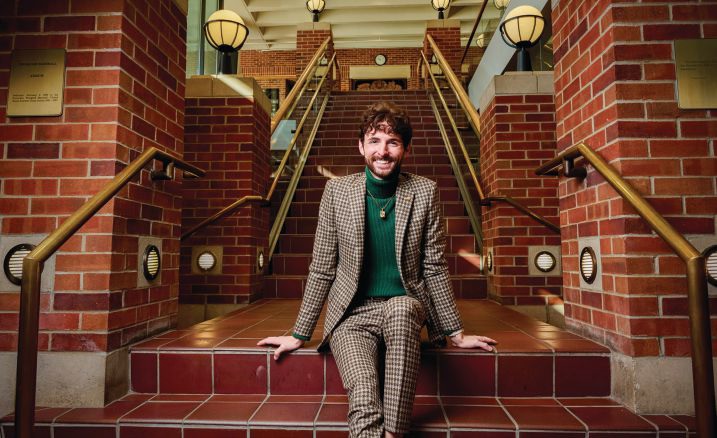We honor 8 students who have made outstanding contributions to their law schools and communities.
Law school can be challenging, time intensive and downright overwhelming. In a landscape where many struggle to keep abreast of their studies, some have also managed to multiply their talents and give back to their school and their community.
For the eighth year, The National Jurist recognizes law students who have provided outstanding service.
What do they have in common? This year’s eight honorees were involved in everything from creating wellness spaces inside a law school to leading continuing legal education programs.
To determine the Law Students of the Year, we asked each law school to nominate one student. We then whittled the list down to eight, which was not an easy task.
Drum roll please…
Brandon Bethel (pictured above)
University of Missouri School of Law
Not every law student enters a room, looks around and says: “Hmm, that drywall could use some work.”
Or: “A fresh coat of paint would be nice.”
And then actually does something about it.
Most law students are not so motivated, given that they have to get through Torts, Constitutional Law and other fun subjects. But Brandon Bethel, a third-year at University of Missouri School of Law, is good with both a laptop and a paint brush.
Entering school during the pandemic, he saw the need to help students by creating calming, progressive and nurturing spaces.
“Law school is a different kind of a beast,” he said. “It would have been a tough transition regardless, but we were already isolated because of the pandemic. When I see people having a hard time, I feel a need to do something.”
One of his first efforts was to help create the Wellness Room, where students can take breaks from the stress of law school. Young mothers also find a haven, as it includes a maternity room. It was previously an office used for storage.
Bethel also renovated many other student spaces, such as the offices of the Student Bar Association, the Black Law Students Association and the Business, Entrepreneurship & Tax Law Review. He also upgraded display cases and artwork throughout the law school. For good measure, he ramped up the student lounge and cafeteria too.
HGTV would love him.
So does the school: “I truly am excited to nominate Brandon for this recognition,” wrote Interim Dean Paul Litton in his nominating letter. “In my 17 years at Mizzou Law, we have not seen a student make a greater impact on our community.”
Bethel said his background has a lot to do with his motivation. He grew up poor in the rural town of Danville, Missouri. There were months when there were concerns about utility bills being met. His father and grandmother worked hard to make sure the family survived such challenges.
We may largely live in a disposable society, but Bethel did not grow up in such an environment. He learned to salvage things that were salvageable. He also gained an appreciation for how a physical environment can affect moods and productivity.
He tackled these projects at Mizzou Law in his spare time. Yes, he fixed drywall, refinished desktops, painted rooms, etc., after school and during winter and summer breaks.
“I don’t sleep very often,” he said.
He must not. In addition to doing this work, he is president of the school’s chapter of OUTLaw, a student organization dedicated to serving the LGBTQ+ law student community, as well as co-chair of the school’s Women’s Law Association fundraising auction.
And he doesn’t take all the credit for these good deeds. He asked to give a shout-out to Michelle Cecil, William H. Pittman professor emerita of law, who helped with fundraising for several of the projects.
He has a simple reason for his passion: “A comfortable environment allows us to have comfortable conversations. Comfort can help decrease stress and help reduce unhealthy competition. It’s important to show that these things are possible so that in the future they can be built upon to help everybody.”
Dontay Proctor-Mills
Seattle University School of Law
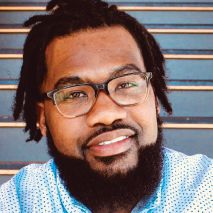
Many law students have great passion for significant causes. Dontay Proctor-Mills is one of them. His passion is promoting racial justice, one of the biggest issues of our time.
In 2021, Proctor-Mills created and led a law symposium featuring the work of Black law professors and legal scholars. The Spotlight Symposium was held again in 2022 and will be an annual event to encourage the next generation of Black legal scholarship and provide a place where students, scholars and legal practitioners can explore contemporary legal issues.
As an editor of the Seattle University Law Review and vice president of the Black Law Student Association, he was in a good position to visualize what a racial justice symposium needed to be and how to make it happen. He oversaw the selection of the keynote speaker and panelists, managed the event and served as an editor of the event transcripts.
One wonders when this law school student sleeps. He works full time as well as attending Seattle University part time. He is set to graduate this spring.
Proctor-Mills describes himself as a “future lawyer working to eliminate racism and all forms of oppression from the legal system by way of policy, litigation or scholarship.” Even before graduation, he’s well on the way to doing that.
Drake Goodson
University of California, Berkeley, School of Law
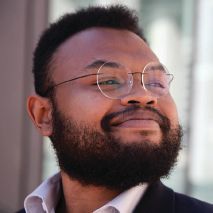
Drake Goodson hails from Alaska, the only state in the nation that doesn’t have an ABA-accredited law school. In the past, that’s caused concern about access to justice in the state. Here’s a law student who has not forgotten his roots.
Goodson, a second-year student, was the founder and co-leader of a recent foray to Alaska by BLAST (Berkeley Law Alternative Service Trips). He wanted to create a pro bono opportunity for himself and his peers to serve his former community.
Alaska is a state where legal needs far outstrip supply. BLAST allows Berkeley Law to redirect resources for the benefit of traditionally overlooked and overburdened places.
Goodson sees his work as making good on responsibilities to Alaskan communities whose natural resources and livelihoods have been drastically altered for government and commercial objectives.
He’s also the co-leader of the Free the Land Project, one of Berkeley’s student-initiated legal services projects. It assists organizations in the Bay Area to navigate city processes involved in land use, housing and environmental justice.
Deborah Schlosberg, director of the school’s pro bono program, said, “Drake is a kind, thoughtful and committed law student who I think makes a big difference in his community through humble leadership and will do so as he continues throughout law school and beyond.”
Dylan Gunaratne
Southwestern Law School

Law school is tough on students in many ways. One challenge, which is thankfully getting more attention of late, is the toll it takes on mental health. And students such as Dylan Gunaratne are helping dramatically in addressing it.
Gunaratne, a second-year student in Southwestern’s accelerated two-year J.D. program, founded a student chapter of the National Alliance on Mental Illness (NAMI).
He did so to educate and support students concerned about mental health during law school. This past fall, Gunaratne worked with NAMI and Southwestern’s Student Bar Association to coordinate A Student Discussion on Lawyer Well-Being, the event celebrating the ABA’s Law School Mental Health Day, which took place on the Southwestern campus in Los Angeles. The event created a platform for students and panelists to discuss the obstacles students face when seeking mental health support and find ways to end the stigma associated with mental health.
“When we formed our NAMI chapter, we were just a small group of students who hoped to inspire other law students who might be feeling isolated,” he said. “We figured that if we were continually learning how to navigate law school while prioritizing our mental health care, contributing to our law school community and achieving our academic goals, others were struggling to strike that balance too.”
Jessica Collier
Widener University Commonwealth Law School
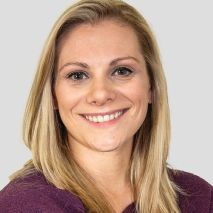
Talk about hitting the ground running. Jessica Collier must have donned running shoes when she entered law school.
In her first year, she successfully pitched a plan for the school to present a continuing legal education program on human trafficking. Collier planned and implemented that program, and because of its popularity, the Harrisburg, Pennsylvania, school ran a follow-up program this year, which Collier was also integral in planning.
Since that time, Collier has taken on several leadership roles. She is the vice president of the school’s Law and Government Student Society and is also the 2L representative for the Business Law Student Society.
Earlier this year, she received the prestigious Reybitz Business Advising Fellowship, and she is a member of the 2023 Wayne Jaffe Business Advising Transactional Law Competition Team, which will compete in Michigan this spring.
Collier is also an active Student Bar Association 1L mentor. And, she volunteers in the community through the Wills for Heroes program, which assists first responders in the preparation of wills and trust documents.
Laura Evans
Chapman University Fowler School of Law
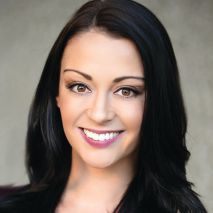
Russia’s invasion of Ukraine has been playing out on our media screens, a brutal showcase that most of us watch helplessly. However, Laura Evans doesn’t just watch.
She’s the student volunteer director of the Ukrainian Mothers and Children Transport (UMACTransport.org) initiative. She directs more than a dozen volunteer law students from Chapman Fowler School of Law in Orange, California, and other law schools throughout the U.S. (and one in the U.K.), who are helping Ukrainian war refugees seek shelter in the United States.
Now a second-year student, Evans took on this demanding role in her first year of law school. Professor Michael Bazyler, who founded the project, applauds Evans’ work in his nomination letter:
“Since the formation of UMACTransport by me and Laura in March 2022, Laura has spent hundreds of hours on this project. Laura comes to Fowler after receiving an MBA from Pepperdine and prior to law school was director of a nonprofit cat shelter, and her organizational skills have been invaluable in having this project run smoothly.
“She directs our weekly Zoom meetings with the student volunteers, manages our pro bono caseload, and has given training seminars to the volunteers on immigration law as it applies to Ukrainian refugees.”
Nicole Jansma
Chicago-Kent College of Law at Illinois Institute of Technology
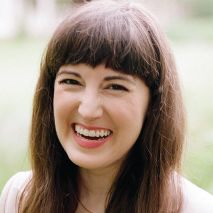
While working for a decade as a behavior analyst for Chicago-area students with developmental disabilities, Nicole Jansma came to a discouraging conclusion.
“One of the unfortunate realities in a school system, especially ones where the bulk of our students come from poor families of color, is there is an intersection between the families we serve and the criminal justice system,” Jansma said.
“After seeing that play out for a decade or so, it was a slow burn realizing I wanted to be serving in a different way, but still serving the same group of people — to reach them earlier in the timeline.”
So defense work it was. Since enrolling at Chicago-Kent College of Law in 2020, Jansma has been laser-focused on becoming a public defender, while at the same time committing herself to an inordinate amount of volunteer work, presiding over and breathing new life into a flagging student group dedicated to public interest work, and taking leadership roles in multiple student organizations.
“Nicole’s volunteer work has been an inspiration for many in the Chicago-Kent community,” said Dean Anita K. Krug. “She’s been recognized nationally for her desire to help those in need, and her focus on becoming an effective public defender is evident.
“In total to date, Jansma has volunteered over 600 pro bono hours to local public service organizations and agencies, including Legal Aid Chicago, the John Howard Association, the Office of the State Appellate Defender of Illinois and the Federal Defender Program of the Northern District of Illinois.”
In addition, she was honored during the 2021 Public Interest Awards for her volunteer work with the John Howard Association, an Illinois-based nonprofit prison watchdog group.
Sydney Warinner
Case Western Reserve University School of Law
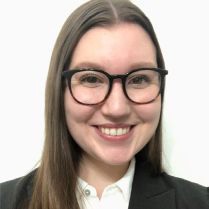
Want an example of high praise? Here is high praise: “In the history of our law school, very few students have ever accomplished as much or made such a significant impact as Sydney Warinner.”
That comes from the school’s co-deans, Jessica Berg and Michael Scharf.
A third-year, Warinner serves as Executive Notes and Comments editor of the Case Western Reserve Law Review.
She is also the executive director of the law school’s Yemen Accountability Project. Working under the supervision of International Chief Prosecutor James Johnson, Warinner heads a team of 55 law students who are preparing white papers and case files for eventual international prosecution of war crimes in the Yemen conflict.
Her moot court experience has been particularly noteworthy. As a first-year, she not only beat out a number of upper- class students to gain a spot on the Jessup Moot Court team but also led the team to a top-three ranking out of 600 teams in the international rounds. As a 2L she led the team to the National Final Four and a top-14 finish in the international rounds. This year, she captained the team.
Warinner has also gained extensive experience during law school as an ACLU Immigrants Rights Project intern; a federal judicial extern at the U.S. District Court, Northern District of Ohio; and a Klatsky Fellow for the Disability Rights Division of Human Rights Watch in New York City.
After graduating, she is expected to become an attorney-adviser in the central office of the Federal Bureau of Prisons, where she worked last summer.

